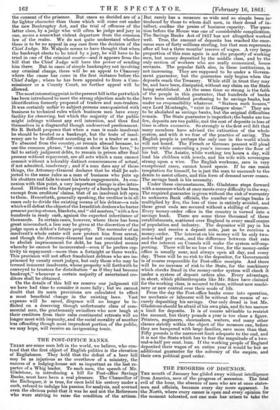THE POST-OFFICE BANKS.
THERE are some men left in the world, we believe, who con- tend that the first object of English politics is the elevation of Englishmen. They hold that the defeat of a beer bill may be as injurious as the overthrow of a ministry, the success of a lodging-house act as important as the last re- partee of a Whig leader. To such men, the speech of Mr. Gladstone, in introducing a bill for Post-office Savings Banks, must have been a real pleasure. The Chancellor of the Exchequer, it is tree, for once held his oratory under a curb, refused to indulge his passion for analysis, and scorned even the obvious point that it was he and not the Reformers who were striving to raise the condition of the artisan. But rarely has a measure so wide and so simple been in- troduced by those to whom dull men, in their dread of in- tellect, confine the praise of business capacity. The ques- tion before the House was one of considerable complication. The Savings Banks Act of 1817 has not altogether worked well. True, the amount of deposits has reached the enor- mous sum of forty millions sterling, but that sum represents after all but a three months' reserve of wages. A very large proportion of this sum again is not the property of working men, but money deposited by the middle class and by the only section of workers who are really economical, house servants. The popular faith also, in these institutions, is not increasing. They are supposed to be under a Govern- ment guarantee, but the guarantee only begins when the deposits reach the Treasury. While still in trust they may be, and have been, dissipated, without any claim on the State being established. At the same time so strong is the faith of the people in this guarantee, that hundreds of banks have been established professing to be savings banks, but under no responsibility whatever. "Sixteen such houses," says Lord Monteagle, "exist in Glasgow alone." They are to be abolished as savings banks, but the original difficulties remain. The State guarantee is imperfect; the banks are too few, deposits are too public, and the cost of deposits in loss of time is often excessive. So strongly is the first evil felt that many members have advised the extinction of the whole system, and with it we fear of the practice of saving. The English people is perhaps the only one in the world which will not hoard. The French or German peasant will plead poverty while concealing a year's income under the floor of his hut. The Asiatic, while working ten hours a day, will load his children with jewels, and his wife with sovereigns strung upon a wire. The English workman save in very exceptional cases, cannot hoard specie. If! he can resist temptation for himself, he is just the man to succumb to the desire to assist others, and this form of demand never ceases. The savings bank is his necessity.
-Under these circumstances, Mr. Gladstone steps forward with a measure which at once meets every difficulty in the way. The required guarantee is given without the risk of warrantry to unknown Bank officials, the number of savings banks is multiplied by five, the loss of time is entirely avoided, and these great ends are secured without a shilling of expense. Every money-order office in the country is turned into a savings bank. There are some three thousand of these establishments, scattered over England in every small cenpre of population and industry. The depositor will pay in his money and receive a deposit note, just as he receives a money-order. The interest on his money will be only two- and-a-half per cent., and the difference between that rate and the interest on Consols will make the system self-sup- porting. There will be no loss of time, for the money-order office is usually near, and always open all day, and every- day. There will be no risk to the depositor, for Government is of course responsible for Post-office receipts. And there will be no increase of risk to the State, for the machinery which checks fraud in the money-order system will check it under a system of deposit orders also. Every advantage, in short, which philanthropists like Mr. Sikes have claimed for the working class, is secured to them, without new machi- nery or new control over their mode of life.
From the day the Post-office banks come into operation, no mechanic or labourer will be without the means of se- curely depositing his savings. Our only dread is lest Mr. Gladstone should be afraid of his own plan, and fix too narrow a limit for deposits. It is of course advisable to restrict the amount, but thirty pounds a year is too close a figure. Printers, engineers, shoemakers, waiters, and many other classes strictly within the object of the measure can, before they are hampered with large families, save more than that. Fifty pounds is the narrowest limit adequate to the end, and it is not the State which has to fear the magnitude of a two- and-a-half per cent. loan. If the working people of England deposited their wages of an entire year it would be but an additional guarantee for the solvency of the empire, and their own political good order.






























 Previous page
Previous page